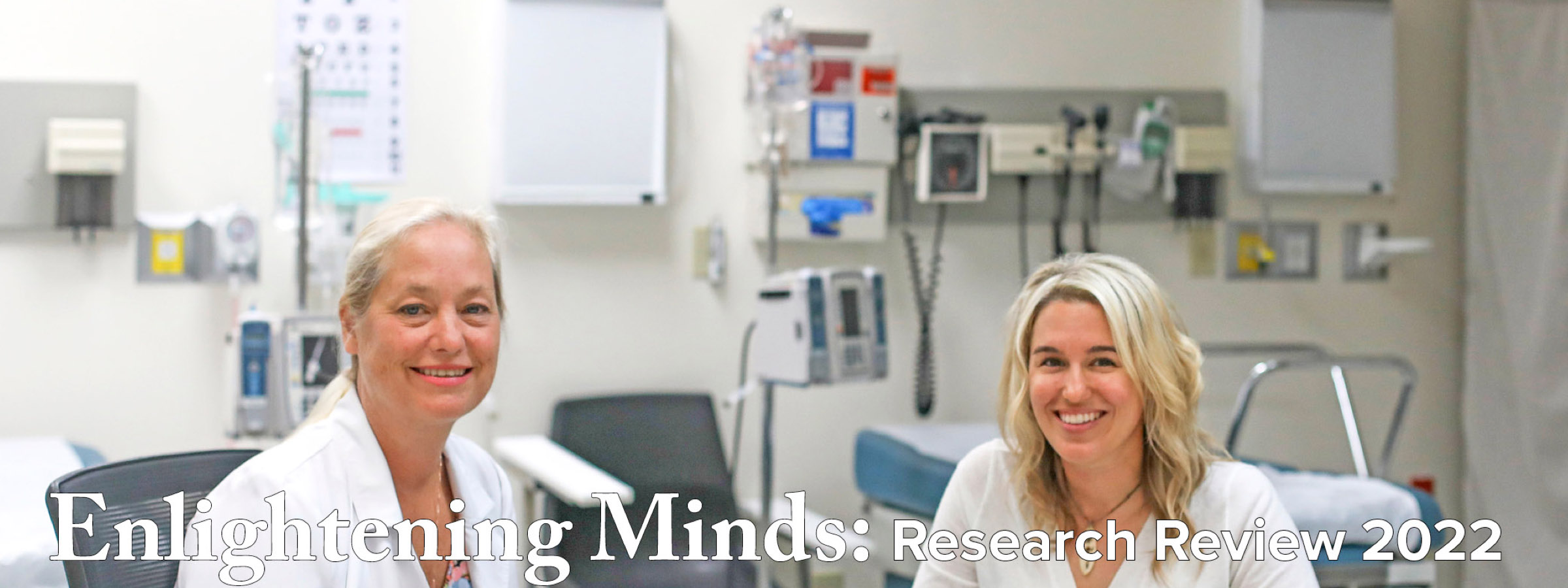
Award-winning research by two PBA School of Nursing professors is helping nurses better understand and serve autistic women who face unique challenges in nursing their babies.
Breastfeeding has been called the “Thanksgiving meal in a teaspoon” because of its many benefits, said Dr. Jane Wilson (at left in photo above), associate dean of the Undergraduate Bachelor of Science Nursing Program. “It’s the recommended way to give your baby nutrition, hydration and antibodies.” But in a study by Wilson and Assistant Professor of Nursing Dr. Briana Andrassy, autistic women reported often feeling over-stimulated, over-touched and overwhelmed in the breastfeeding experience.
“My whole body shivers and cringes and my skin crawls,” said one respondent. Her intense sensory perception, combined with the crying and the sucking sensations from her baby, created a “sensory nightmare.” She and others in the study told of discomfort, anxiety, frustration and stress, typically leading to an emotional eruption or “meltdown.”
The study, “Breastfeeding Experiences of Autistic Women,” was published in MCN, The American Journal of Maternal Child Nursing, and was named the journal’s 2022 Research Article of the Year. The PBA professors have shone light upon an important topic that previously had received little attention from nursing researchers, said Dr. Kathleen Simpson, MCN editor-in-chief.
As a result, “nurses can have more understanding about this specific population and thus be able to offer better guidance and support,” Simpson said. “The article was well written and the research was significant.”
Wilson and Andrassy had the additional honor of seeing their research cited in an Oct. 4, 2022 New York Times story.
Wilson presented the research in Denver at a national conference of nurses. Afterward, she said, “a lot of people came up to me saying ‘I am so thankful to know this information; it never occurred to me that I would have autistic patients, and they’d have specialized needs.’”
To help meet such needs, Wilson and Andrassy outlined “clinical nursing implications,” giving specific steps nurses should take when encountering autistic mothers. They quoted respondents who have felt misunderstood by the medical professionals serving them.
For example, people with autism often refrain from making eye contact during conversation. A nurse offering breastfeeding instruction might interpret the lack of eye contact to mean that the mother isn’t listening and just doesn’t care, said Wilson. “But that simply may be her normal communication style.”
“I think we need understanding, acceptance, respect and nurturing,” said one of the moms in the study. “Don’t view us as broken and less, but as different.”
The researchers had noted those different needs as they began the study. People with autism may experience various communication deficits and discomfort in social situations. “We wanted to be respectful of their limitations and discomforts in an interview process,” Wilson said. So she and Andrassy offered interviews in multiple ways, including telephone calls, Zoom meetings, interactive texts and synchronous emails. They recruited their interview subjects through social media support groups.
“We had a wonderful time interacting with these women,” said Wilson. “I found them to be passionate, persistent and brave in discussing the intimate topic of breastfeeding. They wanted to be a help to other breastfeeding moms out there. They were amazing!”
In teaming up to do the research, Wilson and Andrassy brought complementary areas of expertise. Wilson, with a Ph.D. in nursing, specializes in maternal and child health. Andrassy earned her Doctor of Nursing Practice degree from Palm Beach Atlantic, focusing on autistic children in her DNP scholarly project. She has served for years as head of medical for Surfers for Autism, a local nonprofit that introduces children with developmental delays to therapeutic surfing.
“When Jane came to me about working with this population, that just was very attractive,” Andrassy said, “because I want to help those kids who are then going to potentially be mothers one day, or be fathers who will help support their wives. I thought, ‘What can I do to help in that next step, helping them to become the most independent they possibly can be, but also supported in a community?’ And that’s what we seem to find in our study, that these women were in need of a community.”
Wilson and Andrassy’s work was “groundbreaking,” said Dr. Phyllis King, dean of the School of Nursing. “The award from the American Journal of Maternal Child Nursing supports the importance of this study and the possibilities of using social media to support health in both autistic mothers and their babies.”
Research is very important in PBA’s nursing program, said Wilson, recalling the most recent symposium when DNP graduates presented their projects. “They learn the basics of research, they conduct research projects and they find areas to improve nursing practice. And the patient is the real winner in all of these research practice focus areas.”